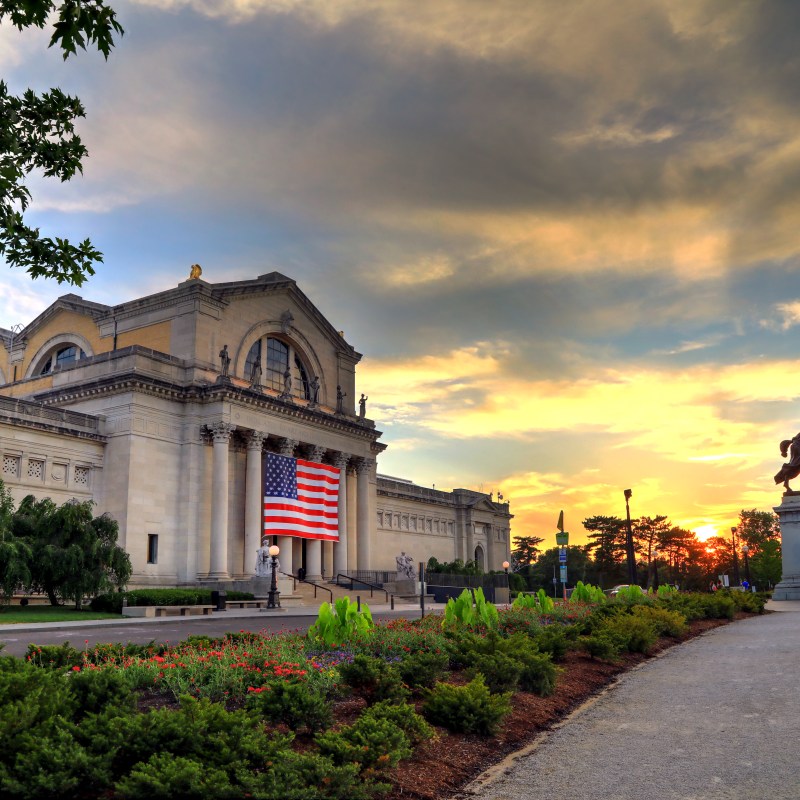
I’m not telling you to avoid New York City or San Francisco.
Videos by TravelAwaits
But consider this a gentle reminder that your travel horizons might be limited if you’re only focused on popular hubs.
Even small cities like New Orleans, Miami, and Savannah pack a punch when it comes to travel, despite the fact that their size and population are one-fourth that of major American metropolises.
In short, focusing on big cities leaves dozens of small cities by the wayside.
And that’s a disservice if you’re a traveler who wants an affordable, surprising, and inspiring vacation.
For example, I’m from Saint Louis, Missouri—a small Midwestern city that, unfortunately, usually gets shouted out in conversations about the country’s most dangerous locations. Though the Lou is small and has its bad neighborhoods, it’s got all the hallmarks of a memorable stay.
There’s history, which you can experience in the weekly Soulard market, open since 1779. There are great eats, from its famous Pappy’s Ribs BBQ to the Hill, an Italian-American neighborhood. Then there are other, more unexpected finds, from world-class public institutions like the Saint Louis Art Museum to the Saint Louis Zoo to Lone Elk Park, where the bison roam. Those last three activities are all absolutely free to the public, to boot.
Here’s my point: you might be wasting thousands of dollars visiting cities that are layered with tourist traps, when cooler adventures lie elsewhere. Many small cities are also primed for great change—just take a look at Cleveland’s projects launching this year, for another example.
If you’re on the fence about forking over a hefty sum to visit crowded, hectic cities, let me convince you to skip big cities for small cities in the future.
Why you should skip big cities for small cities when you travel
Reason #1: Savings
The average hotel price in New York City hovers around $285-300 and around $170 in Los Angeles. Even in some small cities that have blown up for travel now have big-city prices. In Miami, nightly hotel rates drop to around $200-250, then rise to a whopping $300 in New Orleans. That’ll quickly add up even for weekend getaways.
Small cities have a much more reasonable nightly average. Even a pricier small city like Denver has a nightly average hotel rate of around $150. The same for small cities like Cleveland, Kansas City, and Sacramento. And these examples only relate to average nightly hotel rates.
Toss in other factors, such as transportation (whether renting a car or relying on rideshares), dining, entertainment, and shopping, and you can save a lot when you skip big cities for small cities. Plus, don’t forget about spas in small cities. You can get world-class treatments for slightly cheaper.
Reason #2: Smiles
As overtourism fatigue ramps up around the world, I’m more interested in visiting places that are happy to see tourists than ever before. This is a matter of personal interest, but if you’re someone who likes to feel welcome when you travel, skip big cities for small cities.
Locals are less worn down by visitors. In some cases, they might even be delighted to see someone from out of town—and they might have a few tips and recommendations for you, too.
Reason #3: Improvisation
When you visit big cities, you often need to book experiences ahead of time. From museum tickets to dinner reservations to train tickets, it takes a lot of care and consideration to nail your itinerary in a big-city destination.
More hustle = more bustle = more bookings needed.
If you prefer to improvise, consider this your sign to skip big cities for small cities. You’ll find that restaurants don’t fill up within the first hour of opening, while shops and entertainment venues also have a bit more wiggle room in terms of crowds. In short, you have more freedom because you don’t need to worry about competing with hordes of other tourists.
Reason #4: Authenticity
Here’s the magical thing about small cities: you probably can’t name all their famous attractions. While you might know about the heavy-hitters, such as the City Museum in Saint Louis, to use it as an example again.
But you almost certainly don’t know about those hidden gems that locals love.
For example, did you know that Omaha, Nebraska, is home to the country’s largest indoor rainforest at its Henry Doorly Zoo and Aquarium? Or that, just outside Louisville, Kentucky, you can zipline at the world’s only underground adventure course at the Louisville Mega Cavern?
I could keep going, but I think you get my point. If you’re bored by your travel prospects, skip the big cities for small cities. You’ll be delighted by all the oddities and hidden gems you find.
Reason #5: Nature
It’s easier to immerse yourself in nature when you’re not visiting a concrete jungle. Even if you’re not planning on spending a lot of time in the outdoors, you’ll have more opportunities to explore national parks, reserves, and other green areas when you visit small cities.
To use the Cleveland example from before, the city has its own Cleveland Museum of Natural History that recently expanded with brand new exhibits, while the nearby Cuyahoga Valley National Park just turned 50. Both are easily accessible to visitors, letting you bundle in a little time in nature on your trip.
Reason #6: Safety
I can’t guarantee that you’ll be safer if you skip big cities for small cities, since every area has its own unique set of challenges—but you might feel a bit more comfortable in a small city.
Compared to fast-paced hubs like New York City, Los Angeles, and Chicago, smaller regional cities are easier to navigate and come with fewer questions.
So, if you tend to be on high alert during your travels, know that opting for a smaller city can help you settle into your new setting and have some fun. Plus, they tend to be quieter, in case you aren’t a fan of wailing sirens.
